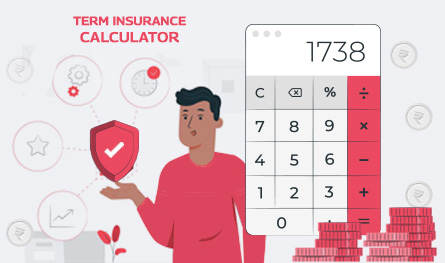Related Articles
 Jan 08, 2025
Jan 08, 2025
Is Varicose Vein surgery covered under the health insurance policy in India
 Health Insurance
Health Insurance
.png)
Medical contingencies are unpredictable. Having a reliable, comprehensive health insurance plan can save your day well without compromising on the quality of healthcare. Rather than buying separate health plans for each family member, you can opt for family health insurance coverage that includes your parents, spouse, and dependent children.
.png)
This typical health cover covers the full family under a single umbrella plan. One single sum insured is shared among all the members included. This means that all the included family members can avail of the policy benefits up to the sum insured limit. The premiums of such plans are decided based on the age of the oldest family member and the chosen coverage span.
You must note here that the existing coverage gets shared among all the family members in the chosen policy as required. Such exclusive comprehensive coverage for all the family members proves more reasonable than separate plans. The claims get settled according to the specific regulations of the chosen insurer and the plan terms.
This is a very popular form of health insurance, ideally designed to cover one individual. Each family member needs to maintain a separate health plan under this system. The principal determinants of premiums for this kind of plan include the current health status, age, and probable risk profile of every insured individual.
If you aren’t seeking health coverage for multiple family members, then you can go for this. Moreover, if there are members in your family who require special coverage for critical illness, cardiovascular issues, cancer, etc., it is best to maintain separate health plans.
The key differences between individual and family health insurance plans are as follows:
In the case of an individual plan, the sum insured amount can be utilised flexibly as and when needed by the insured individual.
However, in a family floater plan, the total sum insured amount is shared among all the family members. If one exhausts a considerable amount, it may come in the way of others till plan renewal.
Pro Tip: If you have a senior citizen or a member with a critical ailment for whom there could be multiple claims in one year, it is best to opt for a separate individual health plan for that person rather than including him/her in the family floater plan.
The oldest family member's current age and health status are the significant determinants of the premium payable amount in the family floater plan. However, the age, health profile, and associated risks are considered in individual plans. This may vary for each member, thereby altering the premium.
Pro Tip: Ideally, a family floater plan should be taken for members of similar age. A separate family floater plan can be taken for senior family members.
A standard family health plan allows coverage for the whole family, including the principal policyholder, spouse, dependent children, and sometimes dependent parents. Some plans also allow coverage for parents-in-law as well.
An individual plan only covers the insured person concerned. Each family member requires a separate individual plan to ensure coverage.
The price of a family floater plan is slightly more reasonable than maintaining separate health plans for every individual family member, especially when there are more than 2 members.
Let’s understand the basic difference between the two.
| Aspect | Individual Health Plan | Family Floater Plan |
| Coverage | Separate coverage for every insured | It gets shared among all the included family members |
| Premium Calculation | Based on the age, health status, and risk profile of the insured individual | Based on the age and health status of the oldest family member, included |
| Dependent Coverage | Solely covers the insured person | Spouses, dependent children, and sometimes dependent parents are covered |
| Price | Depends on the policy choice, coverage span, etc. | A single premium for every member might be lower than a single policy for every member. |
While making the choice, you must critically analyse the specific conditions of your family. If multiple members are without coverage, then choosing a family floater plan could be a favourable solution. However, if that is not the scenario, you can choose individual health plans. Nevertheless, whichever you choose, you have to research multiple plans and grab the best deal critically.
For example, individual health plans work best for young professionals, single people, or those without dependents. It works for senior citizens or high-risk individuals with pre-existing medical conditions or a higher likelihood of claims. Also, if you have specific requirements like critical illness coverage or maternity requirements, individual plans could be a better solution as they can be customised to meet your needs.
On the other hand, a family floater plan is a better solution if you are looking for coverage for a young family with couples and small children, with a low likelihood of simultaneous claims. Also, for families without chronic illnesses or pre-existing conditions requiring frequent claims or if you need an economical option, you could avail of a family floater plan.

Paybima Team
Paybima is an Indian insurance aggregator on a mission to make insurance simple for people. Paybima is the Digital arm of the already established and trusted Mahindra Insurance Brokers Ltd., a reputed name in the insurance broking industry with 17 years of experience. Paybima promises you the easy-to-access online platform to buy insurance policies, and also extend their unrelented assistance with all your policy related queries and services.

If you think of life insurance, chances are you are picturing something people buy in their 30s or 40s. But what if you are 65 or older and just getting started? The good news is that you are never too late. Whether you are thinking of easing the financial burden on your family, covering final expenses, or simply leaving behind a legacy, there are life insurance options tailored just for you.
This article will be a guide to life insurance for senior citizens above 65 years, explaining why it is important, the type of insurance options, and how to get the right policy for you.


Have you ever caught yourself lost in illusions about your daughter's future events, such as her university convocation and first day at work? Her university convocation. When she embarks upon her initial job after graduation will be the day.


Let’s be honest – life insurance planning isn’t exactly someone’s weekend hobby. It is the financial equivalent of flossing: we understand its importance, but we tend to put it off. But somewhere between balancing work and life, you might realise you need to have a solid plan in place – just in case.


We all know that health insurance policies offer a long list of inclusions. However, exclusions are also a crucial aspect of every policy. Overlooking policy documents can surprise you with hidden clauses that you didn't even know existed. To avoid such unpleasant situations and unexpected expenses during medical emergencies, it is crucial to uncover hidden clauses your health insurance policy may contain. When you buy health insurance online, make sure to know all about the policy before signing the document.
From least known exclusions to waiting periods and conditions in the fine print, hidden clauses can affect your overall experience. To help you out, here are the top hidden clauses of a health insurance policy that you should know.

.png)
Lymphocytes, a kind of white blood cells, are an extraordinary army of defenders functioning in the bustling world of our immune system for our body’s immune defence. Let’s know about these mighty warriors who are continually waging war against invading pathogens, viruses, and microbes in detail.
